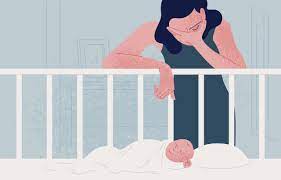
10-30% of patients after delivery.
Postpartum depression may affect up to 20% of women after childbirth.
Postpartum/perinatal mental health conditions are the leading cause of overall and preventable maternal mortality and include a wide variety of mental health conditions, including anxiety, depression, and substance use disorders.
postpartum depression is more accurately, called perinatal depression, because its onset corresponds with pre-pregnancy, pregnancy, and postpartum time frames.
Postpartum depression is associated with impaired mother-infant bonding and with adverse affects in the cognitive, behavioral, and emotional development of the child.
Perinatal depression, which is the occurrence of a depressive disorder during pregnancy or following childbirth, affects as many as one in seven women and is one of the most common complications of pregnancy in the postpartum period.
2/3 of individuals with perinatal depression, have one or more comorbid, psychiatric conditions, mainly anxiety disorders (83%), including generalized anxiety disorder, panic disorder, social phobia, and obsessive compulsive disorder.
Perinatal depression is highly underdetected and undertreated, with more than 75% of those who screen positive receive no treatment.
Postpartum depression can be life-threatening, can interfere with the maternal-infant bond, and some women may experience thoughts about harming themselves or harming their child,
Perinatal depression was estimated in 2012 to affect more than180,000 new mothers (11.5%) annually in the United States.
Perinatal depression can result in negative short and long-term effects on both the woman and child.
Onset is usually within 6 weeks after childbirth and persists from 3-14 months.
Recent studies suggest that postpartum depression may last up to three years after childbirth.
In addition to the typical symptoms of depression, feeling hopeless, loss of interest in activities, withdrawing from friends and family, other symptoms in the perinatal period may include persistent doubt of the ability to take care of an infant, trouble bonding with the infant, and thoughts of self harm or harm of the infant.
The most common postpartum complication with substantial risk for morbidity and death.
The prevalence of depression is similar in pregnant, postpartum and non pregnant females, but the onset of new depression is higher during the perinatal period.
Can have significant negative impact on the patient, the mother-child relationship, the marital relationship.
Can affect offspring leading to lower quality interactions with the mother, higher rates of emotional and behavioral disorders, worse social competence with peers, poor adjustment to school.
Risks include prepregnancy depression history, interpersonal problems, stressful life situations, and lack of emotional, financial and social support, difficult pregnancy, difficult delivery and neonatal health problems.
Additional risk factors include history of physical or sexual abuse, unplanned or unwanted pregnancy, intimate partner violence, complications during pregnancy, low socioeconomic status, lack of social support, and bearing children during adolescence.
Women with a history of bipolar disorder have a high risk of postpartum psychiatric hospital readmissions.
A psychiatric episode in the immediate postpartum predicts for conversion to bipolar disorders during the follow-up period.
Evidence suggests that counseling interventions, such as cognitive behavioral therapy and interpersonal therapy, are effective in preventing perinatal depression in those at increased risk.
Risk factors associated with postpartum depression include: a personal or family history of depression, history of physical or sexual abuse, having an unplanned or unwanted pregnancy, current stress of life events, pre-gestational or gestational diabetes, and complications during pregnancy.
There are currently no clinical guidelines on how to prevent perinatal depression.
Selective serotonin reuptake inhibitors are generally use for additional treatment for moderate-severe postpartum depression.
SSRIs efficacy in postpartum depression is mixed and maximal effects are only achieved after several weeks of treatment.
Serotonin norepinephrine reuptake inhibitors and tricyclic antidepressants have a limited value.
Electroconvulsive therapy is rapid acting and maybe effective for treatment in refractory postpartum depression
